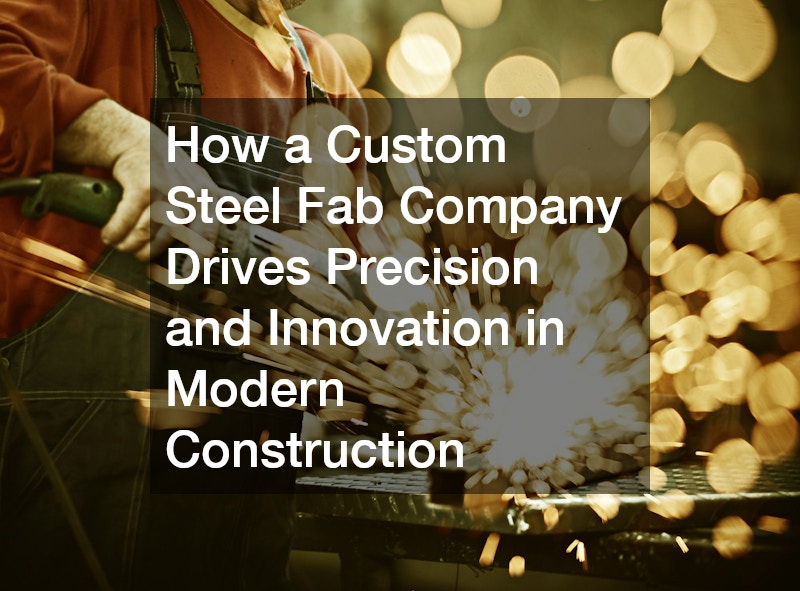Modern construction demands a blend of accuracy, efficiency and innovation. As building designs grow increasingly complex, the role of a custom steel fab company has become essential in delivering the precision and adaptability required to meet today’s architectural challenges. These specialised fabricators transform raw steel into tailored components that ensure strength, durability and aesthetic appeal, supporting the evolving needs of the construction industry.
Precision Engineering Tailored to Project Needs
Precision is at the heart of every successful construction project. A steel fab company offers bespoke fabrication services, tailoring steel components to exact specifications. Unlike mass-produced steel parts, custom fabrication allows architects and engineers to realise unique designs without compromising structural integrity.
This level of precision begins with advanced computer-aided design (CAD) software. Fabricators use CAD models to create detailed plans that guide the cutting, welding and assembly of steel components. By simulating every step in the fabrication process digitally, potential errors are identified and resolved before physical work begins. This reduces material waste and minimises costly onsite adjustments.
Moreover, the integration of computer numerical control (CNC) machines enables fabricators to execute cuts and bends with micron-level accuracy. These automated processes consistently deliver steel parts that fit perfectly, ensuring seamless installation and faster project completion. The ability to produce parts that match precise engineering standards reinforces the role of custom steel fab companies as key partners in modern construction.
Innovation Through Advanced Fabrication Techniques
Innovation in steel fabrication extends beyond precision. Custom steel fab companies continually adopt new technologies and methods to improve the quality and functionality of their products. These innovations directly influence how buildings are designed and constructed.
One notable advancement is the use of laser cutting technology. Laser cutting provides sharper, cleaner edges on steel components compared to traditional cutting methods. This technique also supports intricate patterns and shapes that were once difficult or impossible to achieve. Such flexibility allows architects to incorporate distinctive design elements while maintaining the strength and durability of steel.
Another innovative development is modular steel fabrication. Fabricators produce standardised steel modules in controlled factory environments before transporting them to construction sites for assembly. This method significantly reduces construction time and improves safety by limiting onsite welding and cutting activities. Modular fabrication also minimises the impact of weather delays and enhances overall project efficiency.
In addition, custom steel fab companies are embracing sustainable practices to reduce environmental impact. Techniques such as precision nesting optimise material use by arranging cutting patterns to minimise scrap steel. Fabricators may also recycle steel offcuts and employ energy-efficient machinery. By combining innovation with environmental responsibility, these companies support greener construction practices.
Collaboration With Architects and Builders
A successful construction project depends on strong collaboration between fabricators, architects and builders. Custom steel fab companies play an integral role in this process by providing expert advice and technical support from project inception through to completion.
Early involvement of steel fabricators in the design phase allows for the identification of potential challenges and opportunities. Fabricators offer insights into the feasibility of proposed designs, suggest modifications to improve manufacturability and reduce costs and help select appropriate steel grades for specific applications. This collaborative approach ensures that the final design is both structurally sound and economically viable.
Ongoing communication during fabrication and installation helps keep projects on schedule. Fabricators coordinate delivery timelines, manage quality control and respond promptly to any onsite issues. This level of service builds trust with clients and contributes to the smooth execution of construction plans.
Supporting Diverse Construction Sectors
The versatility of a custom steel fab company makes it invaluable across various construction sectors. Whether working on commercial skyscrapers, residential developments, industrial facilities or infrastructure projects, these companies deliver customised steel solutions tailored to each sector’s demands.
In commercial construction, the need for open-plan spaces and unique architectural features calls for innovative steel designs. Custom fabricators produce structural beams, trusses and façades that support wide spans without compromising aesthetics. This capability allows developers to meet modern commercial expectations for functionality and visual appeal.
Residential construction benefits from the strength and durability of steel framing. Custom fabrication ensures components are precisely made to fit the architect’s vision, supporting complex layouts and reducing onsite modifications. Steel’s resistance to pests and fire also enhances the longevity and safety of homes.
In today’s dynamic construction environment, a custom steel fab company is indispensable for driving precision and innovation. Through advanced technology, expert collaboration and tailored fabrication, these companies transform raw steel into vital components that bring modern architectural visions to life. Their commitment to accuracy and innovation not only supports high-quality construction but also fosters efficiency, sustainability and safety across diverse building projects. As construction demands continue to evolve, the role of custom steel fabricators will remain crucial in shaping the future of the built environment.
.

